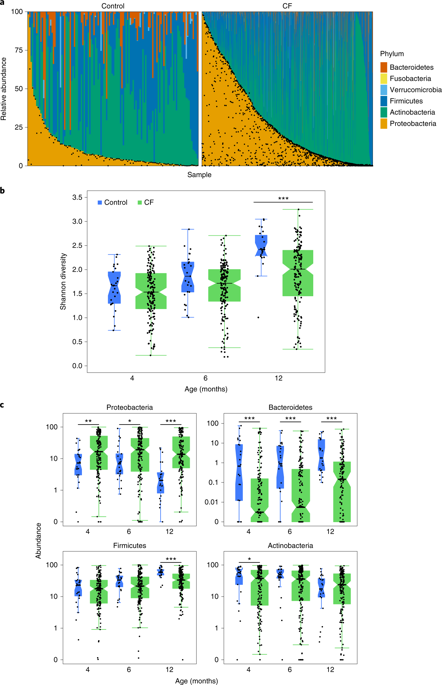Nature Medicine ( IF 82.9 ) Pub Date : 2020-01-20 , DOI: 10.1038/s41591-019-0714-x Hillary S Hayden 1 , Alexander Eng 2 , Christopher E Pope 3 , Mitchell J Brittnacher 1 , Anh T Vo 1 , Eli J Weiss 1 , Kyle R Hager 1 , Bryan D Martin 4 , Daniel H Leung 5 , Sonya L Heltshe 6 , Elhanan Borenstein 2, 7, 8, 9, 10 , Samuel I Miller 1, 2, 11 , Lucas R Hoffman 1, 3, 12

|
Most infants with cystic fibrosis (CF) have pancreatic exocrine insufficiency that results in nutrient malabsorption and requires oral pancreatic enzyme replacement. Newborn screening for CF has enabled earlier diagnosis, nutritional intervention and enzyme replacement for these infants, allowing most infants with CF to achieve their weight goals by 12 months of age1. Nevertheless, most infants with CF continue to have poor linear growth during their first year of life1. Although this early linear growth failure is associated with worse long-term respiratory function and survival2,3, the determinants of body length in infants with CF have not been defined. Several characteristics of the CF gastrointestinal (GI) tract, including inflammation, maldigestion and malabsorption, may promote intestinal dysbiosis4,5. As GI microbiome activities are known to affect endocrine functions6,7, the intestinal microbiome of infants with CF may also impact growth. We identified an early, progressive fecal dysbiosis that distinguished infants with CF and low length from infants with CF and normal length. This dysbiosis included altered abundances of taxa that perform functions that are important for GI health, nutrient harvest and growth hormone signaling, including decreased abundance of Bacteroidetes and increased abundance of Proteobacteria. Thus, the GI microbiota represent a potential therapeutic target for the correction of low linear growth in infants with CF.
中文翻译:

囊性纤维化婴儿的粪便生态失调与早期线性生长障碍有关
大多数患有囊性纤维化 (CF) 的婴儿存在胰腺外分泌功能不全,导致营养吸收不良,需要口服胰酶替代品。新生儿 CF 筛查为这些婴儿提供了早期诊断、营养干预和酶替代品,使大多数患有 CF 的婴儿在 12 个月大时达到其体重目标1。然而,大多数患有 CF 的婴儿在出生后第一年的线性生长仍然很差1。尽管这种早期的线性生长失败与长期呼吸功能和存活率较差有关2,3,尚未确定 CF 婴儿体长的决定因素。CF 胃肠道 (GI) 的几个特征,包括炎症、消化不良和吸收不良,可能会促进肠道生态失调4,5。众所周知,胃肠道微生物组活动会影响内分泌功能6,7,CF 婴儿的肠道微生物群也可能影响生长。我们发现了一种早期的、进行性的粪便菌群失调,它将 CF 和低身长的婴儿与 CF 和正常身长的婴儿区分开来。这种生态失调包括对胃肠道健康、营养获取和生长激素信号传导很重要的类群丰度的改变,包括拟杆菌门丰度的降低和变形菌门的丰度增加。因此,胃肠道微生物群代表了纠正 CF 婴儿低线性生长的潜在治疗靶点。


























 京公网安备 11010802027423号
京公网安备 11010802027423号